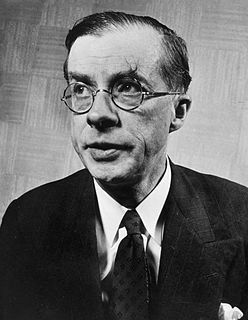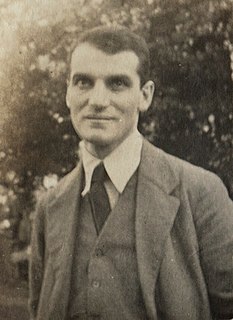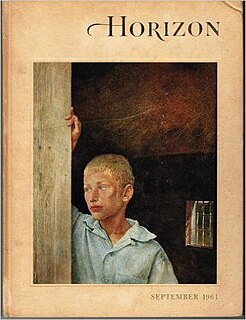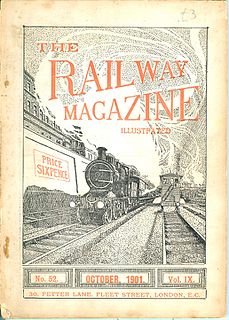Nature is a British weekly scientific journal founded and based in London, England. As a multidisciplinary publication Nature features peer-reviewed research from a variety of academic disciplines, mainly in science, technology, and the natural sciences. It has core editorial offices across the United States, continental Europe, and Asia under the international scientific publishing company Springer Nature. During the late-2010s the weekly had a circulation of 53,000 with a readership of over 400,000. Nature was the world's most cited scientific journal by the Science Edition of the 2018 Journal Citation Reports, making it one of the world's most-read academic journals. It claims an online readership of about 3 million unique readers per month.

Sir Julian Sorell Huxley was an English evolutionary biologist, eugenicist, and internationalist. He was a proponent of natural selection, and a leading figure in the mid-twentieth century modern synthesis. He was secretary of the Zoological Society of London (1935–1942), the first Director of UNESCO, a founding member of the World Wildlife Fund and the first President of the British Humanist Association.

Christopher Isherwood was an Anglo-American novelist, playwright, screenwriter, autobiographer, and diarist. His best-known works include Goodbye to Berlin (1939), a semi-autobiographical novel which inspired the musical Cabaret, A Single Man (1964) adapted as a film by Tom Ford in 2009, and Christopher and His Kind (1976), a memoir which "carried him into the heart of the Gay Liberation movement".

Commentary is a monthly American magazine on religion, Judaism, and politics, as well as social and cultural issues.
Sir James Thomas Knowles was an English architect and editor. He was intimate with the poet Alfred, Lord Tennyson and the founder of the Metaphysical Society to seek rapprochement between religion and science.

The New York Review of Books is a semi-monthly magazine with articles on literature, culture, economics, science and current affairs. Published in New York City, it is inspired by the idea that the discussion of important books is an indispensable literary activity. Esquire called it "the premier literary-intellectual magazine in the English language." In 1970 writer Tom Wolfe described it as "the chief theoretical organ of Radical chic".

The Nineteenth Century was a British monthly literary magazine founded in 1877 by Sir James Knowles. Many of the early contributors to The Nineteenth Century were members of the Metaphysical Society. The journal was intended to publish debate by leading intellectuals.

The Bulletin was an Australian magazine first published in Sydney on 31 January 1880. The publication's focus was politics and business, with some literary content, and editions were often accompanied by cartoons and other illustrations. The views promoted by the magazine varied across different editors and owners, with the publication consequently considered either on the left or right of the political spectrum at various stages in its history. The Bulletin was highly influential in Australian culture and politics until after the First World War, and was then noted for its nationalist, pro-labour, and pro-republican writing. It was revived as a modern news magazine in the 1960s, and was Australia's longest running magazine publication until the final issue was published in January 2008.

John Middleton Murry was an English writer. He was a prolific author, producing more than 60 books and thousands of essays and reviews on literature, social issues, politics, and religion during his lifetime. A prominent critic, Murry is best remembered for his association with Katherine Mansfield, whom he married in 1918 as her second husband, for his friendship with D. H. Lawrence and T. S. Eliot, and for his friendship with Frieda Lawrence. Following Mansfield's death, Murry edited her work.

Henry FitzGerald Heard, commonly called Gerald Heard, was a British-born American historian, science writer, public lecturer, educator, and philosopher. He wrote many articles and over 35 books.
The Huxley family is a British family of which several members have excelled in science, medicine, arts, and literature. The family also includes members who occupied senior positions in the public service of the United Kingdom.
The Listener was a weekly magazine established by the BBC in January 1929 which ceased publication in 1991. The entire digitised archive was made available for purchase online to libraries, educational and research institutions in 2011.
The Contemporary Review is a British biannual, formerly quarterly, magazine. It has an uncertain future as of 2013.

The 1860 Oxford evolution debate took place at the Oxford University Museum in Oxford, England, on 30 June 1860, seven months after the publication of Charles Darwin's On the Origin of Species. Several prominent British scientists and philosophers participated, including Thomas Henry Huxley, Bishop Samuel Wilberforce, Benjamin Brodie, Joseph Dalton Hooker and Robert FitzRoy.
Steven Pearlstein is an American columnist. He writes a column on business and the economy that is published twice weekly in The Washington Post. In 2008 Pearlstein received the Pulitzer Prize for Commentary for "his insightful columns that explore the nation's complex economic ills with masterful clarity" at The Washington Post. In the fall of 2011, he became the Robinson Professor of Political and International Affairs at George Mason University.
Time and Tide was a British weekly political and literary review magazine founded by Margaret, Lady Rhondda in 1920. It started out as a supporter of left wing and feminist causes and the mouthpiece of the feminist Six Point Group. It later moved to the right along with the views of its owner. It always supported and published literary talent.
The Nation and Athenaeum, or simply The Nation, was a United Kingdom political weekly newspaper with a Liberal/Labour viewpoint. It was formed in 1921 from the merger of the Athenaeum, a literary magazine published in London since 1828, and the smaller and newer Nation, edited by Henry William Massingham.

Horizon: A Review of Literature and Art was a literary magazine published in London, UK, between December 1939 and January 1950. Published every four weeks, it was edited by Cyril Connolly, who made it into a platform for a wide range of distinguished and emerging writers. It had a print run of 120 issues or 20 volumes.

Horizon was a magazine published in the United States from 1958 to 1989. Originally published by American Heritage as a bi-monthly hardback, Horizon was subtitled A Magazine of the Arts. In 1978, Boone Inc. bought the magazine, which continued to cover the arts. Publication ceased in March 1989. Recently, American Heritage announced its intention to digitize essays from past issues.

George Augustus Nokes (1867–1948), often known by his pen-name G.A. Sekon, was the founding editor of The Railway Magazine.











